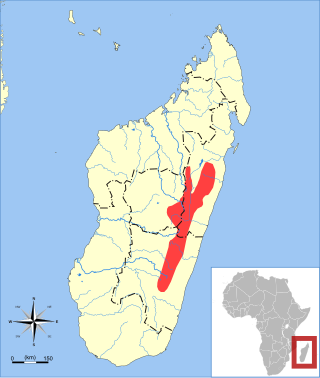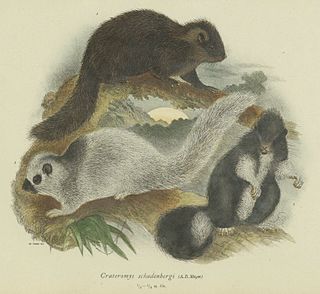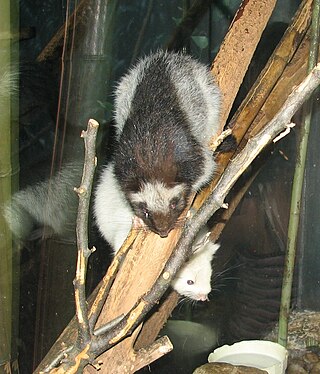
The Nesomyidae are a family of African rodents in the large and complex superfamily Muroidea. It includes several subfamilies, all of which are native to either continental Africa or to Madagascar. Included in this family are Malagasy rodents, climbing mice, African rock mice, swamp mice, pouched rats, and the white-tailed rat.

The Malagasy rodents are the sole members of the subfamily Nesomyinae. These animals are the only native rodents of Madagascar, come in many shapes and sizes, and occupy a wide variety of ecological niches. There are nesomyines that resemble gerbils, rats, mice, voles, and even rabbits. There are arboreal, terrestrial, and semi-fossorial varieties.

Batomys is a genus of rodent endemic to the Philippines. It has six extant described species.

The Betsileo short-tailed rat is a species of rodent in the family Nesomyidae. It is found only in Madagascar. Its natural habitats are subtropical or tropical dry forests and subtropical or tropical dry shrubland.

The gregarious short-tailed rat is a species of rodent in the family Nesomyidae. It is found only in Madagascar. Its natural habitats are subtropical or tropical dry forests and subtropical or tropical dry shrubland.

The giant bushy-tailed cloud rat or Luzon bushy-tailed cloud rat is a large, endangered species of rodent in the family Muridae. It is only found in pine and mossy forest at altitudes of 2,000–2,740 metres (6,560–8,990 ft) in the Central Cordillera of Luzon, the Philippines. Relatively little is known about its behavior, but it is nocturnal, mainly arboreal and feeds on various types of vegetation.

Eliurus is a genus of rodent in the family Nesomyidae. It contains the following species:

Leopoldamys is a genus of rodents in the family Muridae endemic to Southeast Asia. It contains the following species:

Nesokia is a genus of rodent in the family Muridae endemic to West Asia and Central Asia known as the short-tailed bandicoot rats.

The short-tailed bandicoot rat is a species of rodent in the family Muridae. Other common names include short-tailed mole-rat, Indian bandicoot, bandicoot-rat, flat-tooth rat and short-tailed nesokia.

Phloeomys, the slender-tailed cloud rats, is a genus of large rodents in the family Muridae. Both species in this genus are endemic to the island of Luzon in the Philippines. Although their tail is covered by hairs, it is considerably less dense and shorter than in the rarer bushy-tailed cloud rats that also inhabit the Philippines.

The Malayan field rat, Malaysian field rat or Malaysian wood rat, is a species of rodent in the family Muridae. It is nocturnal and mainly arboreal and is found in Malaysia, Thailand, Indonesia and the Philippines. It is a common species and the International Union for Conservation of Nature has assessed it as being of "least concern".
The Ceram rat, also known as the Seram Island mountain rat, is a species of rodent in the family Muridae. It is found only in Seram Island, Indonesia, where it has been recorded on Mount Mansuela. It is the only species of its genus, Nesoromys.

Muennink's spiny rat or Okinawa spiny rat is a species of rodent in the family Muridae. Endemic to Okinawa Island, Japan, its natural habitat is subtropical moist broadleaf forest. The karyotype has 2n = 44. Its sex chromosomes are abnormally large, while the other two species in Tokudaia have lost their Y chromosome. It is found only on the northern part of the island, above 300 m, and is thought to inhabit an area of less than 3 km2.

Voalavo is a genus of rodent in the subfamily Nesomyinae, found only in Madagascar. Two species are known, both of which occur in mountain forest above 1250 m (4100 ft) altitude; the northern voalavo lives in northern Madagascar and eastern voalavo is restricted to a small area in the central part of the island. The genus was discovered in 1994 and formally described in 1998. Within Nesomyinae, it is most closely related to the genus Eliurus, and DNA sequence data suggest that the current definitions of these two genera need to be changed.

The Malagasy mountain mouse or Koopman's montane voalavo is a rodent within the subfamily Nesomyinae of the family Nesomyidae. It is monotypic within the genus Monticolomys, and is closely related to the big-footed mouse (Macrotarsomys). It is found in the highlands of eastern Madagascar. A small mouse-like rodent, it is dark brown on the upperparts and dark gray below. It has small, rounded, densely haired ears and broad feet with well-developed pads. The long tail lacks a tuft at the tip. The skull is delicate and lacks crests and ridges on its roof.

Grandidier's tufted-tailed rat is a species of rodent from the family Nesomyidae. Morphological evidence suggests that Grandidier's tufted-tailed rat is most closely related to Petter's tufted-tailed rat, E. petteri. However, Grandidier's tufted-tailed rat is the smaller of the two species.
The Yunnan bush rat is a species of rodent from the family Muridae. It has just recently been released from synonymy with the Manipur bush rat, and so there is very little information about it. It was recognized as a separate species due to its much larger body size in comparison to the Manipur bush rat, relatively shorter tail, pure white underparts as opposed to gray, significantly shorter diastema, and shorter palate in relation to its skull. It is located only in Yunnan province of the People's Republic of China, where it known only from Tongbiguan Nature Reserve in Ruili City.
The short-tailed Talaud mosaic-tailed rat or the short-tailed Talaud melomys is a species of rodent in the family Muridae. It is endemic to Karakelong and Salebabu in the Talaud Islands in Indonesia where it occurs in forest habitats. The long-tailed Talaud mosaic-tailed rat is also present on the islands and the shorter tail of this species means that it is likely to be mainly terrestrial whereas M. talaudium is largely arboreal.














